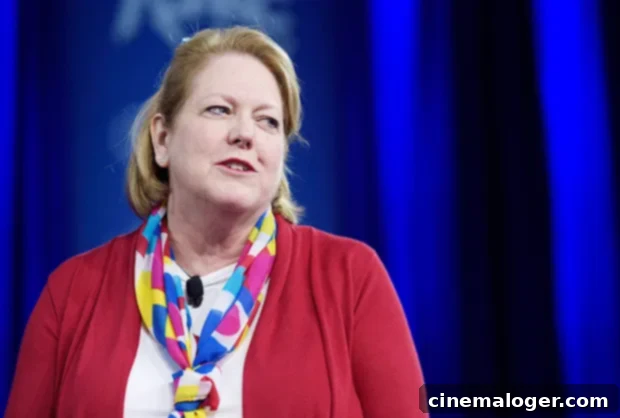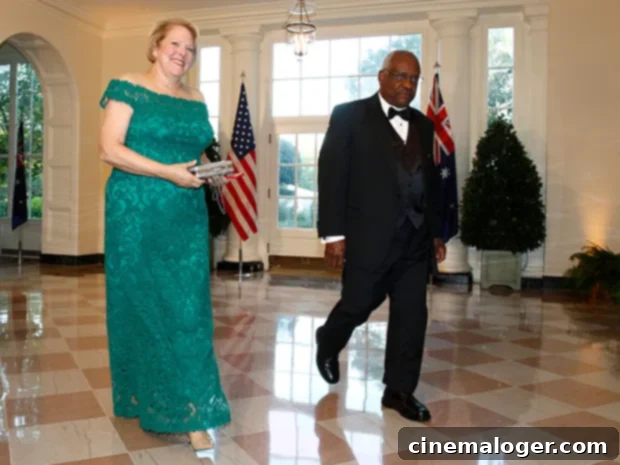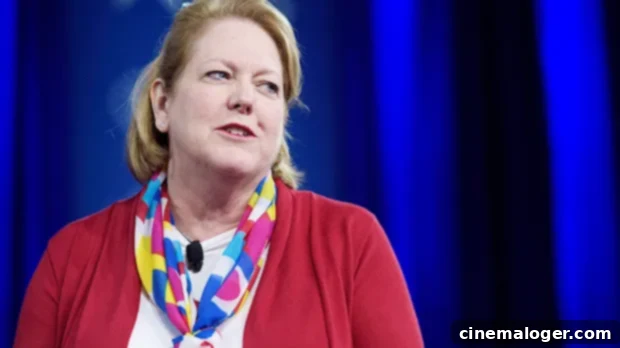Ginni Thomas: Exploring the Conservative Activist’s Influence Amidst 2020 Election Challenges and January 6 Scrutiny
Virginia “Ginni” Thomas is a prominent conservative political activist whose decades-long career has placed her at the intersection of grassroots movements and high-level political advocacy. As the wife of U.S. Supreme Court Justice Clarence Thomas, her activities have frequently drawn attention, particularly in recent years due to her involvement in efforts to challenge the 2020 presidential election results. Her testimony to the House Select Committee investigating the January 6, 2021, Capitol insurrection, where she stated she did not discuss her “campaign activities” with her husband, brought renewed focus on the ethical implications of her unique position.
Ginni Thomas’s public profile escalated dramatically as revelations emerged about her extensive communications and efforts linked to the 2020 election and its aftermath. These disclosures have not only highlighted her passionate commitment to conservative causes but have also ignited a national debate about the boundaries of political activism for spouses of Supreme Court justices and the potential for conflicts of interest within the nation’s highest judicial body. Understanding Ginni Thomas’s background, her specific actions, and the controversies that have defined her public life is crucial to grasping the complexities of America’s contemporary political landscape.
Latest Developments: Jan. 6 Committee’s Focus on Ginni Thomas
Update (June 16, 2022): The House Select Committee investigating the January 6, 2021, attack on the U.S. Capitol intensified its scrutiny of Ginni Thomas. Representative Bennie G. Thompson (D-Miss.), who served as chairman of the committee, announced plans to formally invite Ginni Thomas for an interview. This development marked a significant escalation, as Thomas was not initially anticipated to be a central figure in the public hearings. However, investigators revealed that newly obtained email correspondence between Thomas and White House lawyer John Eastman indicated that her efforts to overturn the 2020 election were “more extensive than previously known.” The committee sought to understand the full scope of her involvement, her motivations, and any connections she may have had to the broader campaign to prevent the certification of electoral votes.
John Eastman was a key figure in the legal strategy to pressure Vice President Mike Pence to reject electoral votes on January 6. The discovery of communications between Thomas and Eastman suggested a more coordinated and robust effort on her part to influence the outcome, moving beyond mere advocacy into direct engagement with architects of the legal challenges. This revelation underscored the committee’s commitment to following all credible leads, regardless of the individuals involved, to fully uncover the circumstances leading up to the insurrection.
Update (June 10, 2022): Earlier revelations from The Washington Post exposed Ginni Thomas’s direct outreach to state-level legislators in Arizona. Findings showed she sent messages to 29 legislators in Arizona, urging them to overturn the 2020 election results in favor of then-President Donald Trump. Utilizing a platform called “Free Roots,” designed to facilitate communication with lawmakers, Thomas disseminated messages that implored local politicians to take decisive action. The core of her message was a plea for these leaders to watch a video and “consider what will happen to the nation we all love if you do not stand up and lead,” specifically encouraging them to disregard the popular vote and instead choose electors who favored Trump.
This direct appeal to state legislators represented a concrete effort to subvert the democratic process at a critical juncture. Her calls for local leaders to override the will of the voters and send a slate of electors contrary to the popular vote were consistent with the broader “fake electors” scheme that was a central component of the campaign to keep Trump in power. The revelation of her coordinated efforts across multiple states, particularly in swing states like Arizona, brought to light the depth of her engagement and the strategic nature of her activism following the 2020 election.
Original Context: Ginni Thomas, 65, an accomplished attorney, has been married to Supreme Court Justice Clarence Thomas for decades. Her conservative activism gained significant national attention on September 29, 2022, when she provided testimony to the January 6 committee. During her appearance, the Omaha, Nebraska-born activist firmly denied discussing her political activities related to the 2020 election with her husband. “Regarding the 2020 election, I did not speak with him at all about the details of my volunteer campaign activities,” she stated under oath in her opening remarks, obtained by CNN. She further clarified, “And I did not speak with him at all about the details of my post-election activities, which were minimal, in any event. I am certain I never spoke with him about any of the legal challenges to the 2020 election, as I was not involved with those challenges in any way.”
Despite her assertions of a clear delineation between her work and her husband’s, Ginni Thomas’s extensive connections to the political world and her role in encouraging former President Donald Trump’s administration to challenge the 2020 election results have sparked intense scrutiny. Critics argue that even if direct discussions did not occur, her high-profile activism creates an appearance of impropriety and raises ethical questions for her husband, particularly given the Supreme Court’s role in adjudicating election-related cases. This ongoing controversy has prompted a closer look at her storied career and her history of conservative advocacy.

Key Insights into Ginni Thomas’s Activism and Controversies
1. Ginni Thomas Actively Urged the Trump Administration to Overturn the 2020 Election
One of the most significant revelations concerning Ginni Thomas’s post-election activities came on March 25, 2022, when The Washington Post and CBS News published excerpts from text messages exchanged between her and Trump’s Chief of Staff, Mark Meadows. These messages, part of a trove of 2,320 texts Meadows provided to the House select committee investigating the January 6 attack, unequivocally demonstrated her personal and fervent efforts to encourage the overturning of the 2020 election. In one particularly striking message, Thomas told Meadows, “Do not concede. It takes time for the army who is gathering for his back.” This statement reflected a deep conviction that the election was fraudulent and that Trump should continue to fight the results.
Her texts also revealed her embrace of extreme conspiracy theories, including references to “Watermarked ballots” – a QAnon-adjacent belief that legitimate ballots were secretly marked to expose fraud. Furthermore, Ginni Thomas actively pressed Trump’s Chief of Staff to appoint Sidney Powell, a lawyer and prominent conspiracy theorist, to lead Mr. Trump’s legal team. Powell was known for promoting outlandish claims about widespread election fraud involving foreign actors and voting machines. Thomas’s direct communication with a senior White House official, coupled with her endorsement of discredited theories and controversial legal figures, underscored the depth of her commitment to the “Stop the Steal” movement and raised serious questions about the nature of her influence within conservative circles during a critical period for American democracy.
2. She Attended the “Stop The Steal” Rally on January 6
Ginni Thomas confirmed her presence at the January 6, 2021, “Stop The Steal” rally that preceded the Capitol riot. In a March 16, 2022, interview with the Washington Free Beacon, she acknowledged attending the event. The rally, held near the White House, brought together thousands of Trump supporters fueled by unsubstantiated claims of election fraud. However, Thomas maintained that she left the demonstration before the crowd marched to the U.S. Capitol and before the ensuing violence and breach of the building began. While her attendance at a peaceful protest is her constitutional right, the context of the rally — which quickly devolved into a violent insurrection — brought further scrutiny to her judgment and her alignment with the more extreme elements of the conservative movement.
Her presence at an event that culminated in an attack on American democracy raised eyebrows, especially given her husband’s position on the Supreme Court. Although she asserted she was not involved in the subsequent riots, her decision to attend a rally promoting claims that the election was stolen solidified her image as a dedicated, albeit controversial, figure within the conservative activist landscape.

3. Ginni Thomas is No Stranger to Controversy
Ginni Thomas’s public life has been marked by controversy long before the 2020 election and January 6. Her steadfast support for her husband, Justice Clarence Thomas, during his tumultuous 1991 Supreme Court confirmation hearings is a prime example. During those hearings, Justice Thomas faced explosive allegations of sexual harassment from lawyer Anita Hill, who had worked for him years prior. Ginni Thomas stood firmly by her husband’s side throughout the contentious proceedings, which captivated the nation and deeply divided public opinion.
Years later, on October 9, 2010, Ginni Thomas reignited the historical dispute by leaving a voicemail message for Anita Hill. In the message, she demanded that Hill apologize to Justice Thomas, stating, “I just wanted to reach across the airwaves and the years and ask you to consider something. I would love for you to consider an apology sometime in the near future for the damage that you caused.” Hill, however, declined the demand, reiterating that her accounts were truthful and that there was nothing for which to apologize. This incident demonstrated Ginni Thomas’s fierce loyalty and willingness to engage directly with past controversies, further cementing her image as a staunch defender of her husband and conservative principles.
4. She Has Held Several Influential Conservative Positions
Ginni Thomas’s career trajectory showcases a history of involvement in influential conservative organizations and government roles, positioning her as a significant player in the right-wing ecosystem. Early in her career, she served in the Labor Department during George H.W. Bush’s administration and later as an aide for then-Texas Representative Dick Armey, a prominent conservative voice. These early experiences provided her with direct exposure to federal policymaking and legislative processes.
Her influence grew significantly when she joined The Heritage Foundation, one of the most respected and powerful conservative think tanks in the United States. At Heritage, she helped shape conservative policy and advocacy efforts, contributing to the intellectual backbone of the movement. In late 2009, she founded Liberty Central, a non-profit lobbying group aimed at mobilizing grassroots conservative activism. Through Liberty Central, Thomas sought to champion core conservative values, oppose what she viewed as government overreach, and influence elections. Her leadership in these organizations allowed her to build extensive networks within the conservative movement and exert considerable influence on policy discussions and political strategies, well before the 2020 election controversies.
5. Ginni Thomas Insists She and the Justice Do Not Discuss Their Work
Perhaps one of the most contentious aspects of Ginni Thomas’s activism is her repeated assertion that she and Justice Clarence Thomas maintain a strict separation between their professional lives, particularly regarding his judicial work and her political advocacy. She has consistently insisted that there are no ethical qualms about their respective roles. In a 2019 interview with the Washington Free Beacon, she articulated this stance, stating, “Like so many married couples, we share many of the same ideals, principles, and aspirations for America. But we have our own separate careers, and our own ideas and opinions too. Clarence doesn’t discuss his work with me, and I don’t involve him in my work.”
However, these claims have faced intense skepticism and criticism, especially in light of her efforts to overturn the 2020 election results, which eventually reached the Supreme Court. Critics argue that even if direct conversations about specific cases do not occur, the appearance of a conflict of interest is undeniable. The spouse of a Supreme Court justice engaging in partisan political activities that directly relate to matters adjudicated by the Court raises serious ethical questions about judicial impartiality and the integrity of the Court. Calls for Justice Thomas to recuse himself from cases involving the 2020 election or January 6 investigations have grown louder, highlighting the ongoing tension between Ginni Thomas’s right to activism and the perceived need for the Supreme Court to remain above reproach and insulated from political influence.
The Continuing Impact of Ginni Thomas’s Activism
Ginni Thomas remains a compelling and often polarizing figure in American politics. Her decades of conservative activism, culminating in her involvement in the challenges to the 2020 election, have placed her at the center of critical national conversations about political ethics, judicial independence, and the future of American democracy. While she asserts her right to independent political expression, her marriage to a Supreme Court Justice inevitably intertwines her actions with the perceived credibility and impartiality of the nation’s highest court. As investigations continue and public scrutiny intensifies, Ginni Thomas’s role serves as a potent reminder of the complex and often blurred lines between personal conviction, political advocacy, and the integrity of democratic institutions.
